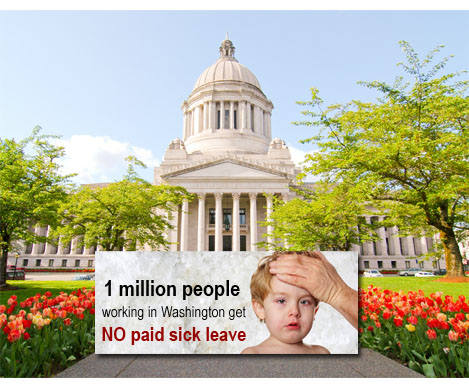NEWS ROUNDUP
Port progress, paid sick leave, billionaire party…
Tuesday, January 27, 2015
PORT CONTRACT
 ► From AP — Employers: Agreement made on key issue in port labor dispute — Negotiators working on a new contract for dockworkers at West Coast seaports, which handle about $1 trillion worth of cargo annually, have resolved a key dispute in their difficult talks, an association representing employers said Monday. The new agreement addresses neither wages nor pensions, but what would seem an ancillary issue: who maintains and repairs the truck beds used to haul containers of cargo from dockside yards to distribution warehouses. “This has been a major topic of conversation for a few weeks, and with this tentative agreement, the hope is we can make progress toward reaching a final contract,” said a PMA spokesman.
► From AP — Employers: Agreement made on key issue in port labor dispute — Negotiators working on a new contract for dockworkers at West Coast seaports, which handle about $1 trillion worth of cargo annually, have resolved a key dispute in their difficult talks, an association representing employers said Monday. The new agreement addresses neither wages nor pensions, but what would seem an ancillary issue: who maintains and repairs the truck beds used to haul containers of cargo from dockside yards to distribution warehouses. “This has been a major topic of conversation for a few weeks, and with this tentative agreement, the hope is we can make progress toward reaching a final contract,” said a PMA spokesman.
ALSO TODAY at The Stand — KIRO’s Dori Monson owes all longshore workers an apology (by Vivian J. Malauulu)
STATE GOVERNMENT
► From NPR — Oregon, Washington propose $12 state minimum wages — Democrats in the Oregon Legislature have filed proposals to raise the state minimum wage in stages from the current $9.25 per hour up to $12.20 or $15. But the Washington State Legislature Monday got a head start in considering a similar increase to $12 per hour. Washington currently has the highest state minimum at $9.47. An overflow crowd showed up in Olympia for the first hearing on a proposal to raise that in four steps to $12 per hour. Several small business owners spoke in favor of it.
► In today’s Spokesman-Review — Statewide minimum wage of $12 debated
 ► In today’s Olympian — Bill would require all but smallest businesses to offer sick leave — Some lawmakers want to establish minimum standards for paid sick and safe leave for Washington workers. Under House Bill 1356, employers with more than four full-time or equivalent employees would be required to grant paid sick leave to employees for medical reasons involving themselves or family members. Rep. Laurie Jinkins (D-Tacoma) said she’s sponsoring the bill in hopes that it decreases the spread of highly transmittable illnesses, and that it also prevents workers from being punished for tending to the health needs of their families and to themselves.
► In today’s Olympian — Bill would require all but smallest businesses to offer sick leave — Some lawmakers want to establish minimum standards for paid sick and safe leave for Washington workers. Under House Bill 1356, employers with more than four full-time or equivalent employees would be required to grant paid sick leave to employees for medical reasons involving themselves or family members. Rep. Laurie Jinkins (D-Tacoma) said she’s sponsoring the bill in hopes that it decreases the spread of highly transmittable illnesses, and that it also prevents workers from being punished for tending to the health needs of their families and to themselves.
► In today’s Olympian — Stopgap spending deal would re-open 45 beds at Western State Hospital — The state psychiatric hospital would get more space for patients under a deal between Democrats and Republican in the state House for patching state funding gaps through June.
► In the P.S. Business Journal — State business leaders backing new ‘Opportunity Washington’ plan — State business leaders are proposing a new education and infrastructure plan called “Opportunity Washington” that will be introduced today in Olympia.
 ► In the P.S. Business Journal — Kill Bertha? Two Republican senators want it done, now — Two Republican Senators (Michael Baumgartner and Doug Ericksen) want to kill the Bertha tunneling project, and want it killed immediately. “I have great concern that this project is headed down a path that will lead to massive cost overruns,” said Ericksen, who added that the best solution would be to bury the $80 million Bertha where it sits.
► In the P.S. Business Journal — Kill Bertha? Two Republican senators want it done, now — Two Republican Senators (Michael Baumgartner and Doug Ericksen) want to kill the Bertha tunneling project, and want it killed immediately. “I have great concern that this project is headed down a path that will lead to massive cost overruns,” said Ericksen, who added that the best solution would be to bury the $80 million Bertha where it sits.
LOCAL
► In today’s News Tribune — Tacoma sick leave policy could see council vote Tuesday — The Tacoma City Council is poised to vote on a policy that would require all Tacoma businesses to provide at least three days of paid sick leave to all employees.
ALSO TODAY at The Stand — Tonight in Tacoma: 3 sick days are not enough!
 ► In today’s (Longview) Daily News — Little progress, but talks continue between KapStone, union — Company and union officials met face-to-face Monday morning for the first time in 10 days. After its members rejected KapStone’s contract offer in December, the AWPPW handed the company a counterproposal but called it “incomplete” because there were still “mandatory subjects of bargaining” to discuss. On Monday, KapStone rejected that partial counterproposal and asked the union to submit a complete counteroffer within 10 days. The union will respond within that time frame.
► In today’s (Longview) Daily News — Little progress, but talks continue between KapStone, union — Company and union officials met face-to-face Monday morning for the first time in 10 days. After its members rejected KapStone’s contract offer in December, the AWPPW handed the company a counterproposal but called it “incomplete” because there were still “mandatory subjects of bargaining” to discuss. On Monday, KapStone rejected that partial counterproposal and asked the union to submit a complete counteroffer within 10 days. The union will respond within that time frame.
► In today’s Tri-City Herald — Washington crops hit $10 billion record — Washington agriculture broke records for the third consecutive year, with production values reaching $10.2 billion in 2013.
► From AP — China accepting all U.S. apple varieties — For the first time, all varieties of apples from the United States will go on sale in China. A deal was reached last week between officials for the United States and Chinese governments to grant access to all U.S. apple varieties, instead of just Red Delicious and Golden Delicious.
EDITOR’S NOTE — Barriers to trade can be lowered in the same way they have for generations, through negotiations. Giant “trade agreements” that include language granting corporate tribunals authority over governments (and other things that have nothing to do with trade) are not necessary to expand trade.
► In today’s News Tribune — Tacoma paper mill part of industry mega-merger — The former Simpson Tacoma Kraft paper mill is likely to get a new owner just months after Simpson sold it to RockTenn Co. of Georgia. RockTenn is merging with MeadWestvaco.
FEDERAL GOVERNMENT
 ► In today’s NY Times — Koch brothers’ budget of $889 million for 2016 is on par with both parties’ spending — The political network overseen by the conservative billionaires Charles G. and David H. Koch plans to spend close to $900 million on the 2016 campaign, an unparalleled effort by coordinated outside groups to shape a presidential election that is already on track to be the most expensive in history. The spending goal, revealed Monday at the Kochs’ annual winter donor retreat near Palm Springs, Calif., would allow their political organization to operate at the same financial scale as the Democratic and Republican Parties.
► In today’s NY Times — Koch brothers’ budget of $889 million for 2016 is on par with both parties’ spending — The political network overseen by the conservative billionaires Charles G. and David H. Koch plans to spend close to $900 million on the 2016 campaign, an unparalleled effort by coordinated outside groups to shape a presidential election that is already on track to be the most expensive in history. The spending goal, revealed Monday at the Kochs’ annual winter donor retreat near Palm Springs, Calif., would allow their political organization to operate at the same financial scale as the Democratic and Republican Parties.
EDITOR’S NOTE — Thanks, Supreme Court!
► In today’s NY Times — Supreme Court rules against retirees in union health benefits case — The Supreme Court on Monday ruled that a chemical company may be able to cut the health benefits of its retired workers, unanimously reversing an appeals court ruling that said the benefits had vested for life.
EDITOR’S NOTE — Thanks again.
► In The Hill — House Democrats launch pressure campaign on paid leave — House Democrats introduced a mandatory paid parental leave bill Monday as they sought to force GOP lawmakers to take a stance on a proposal they believe enjoys broad public support. The bill, which allows federal employees to take six weeks of paid time off for the birth, adoption or foster placement of a child, comes on the heels of President Obama’s renewed call for a national mandatory paid leave policy.
► In The Hill — Budget office lowers ACA price tag by 20 percent — The law’s insurance provisions are now expected to cost $571 billion through 2019 — a drop of about $139 billion from the government’s earliest estimates five years ago, according to the Congressional Budget Office.
NATIONAL
 ► From Reuters — Union signals U.S. refinery workers may have to go on strike — The United Steelworkers union (USW) signaled on Monday a strike by U.S. refinery workers may be necessary to win what it calls a fair contract from oil companies. The last nationwide refinery workers strike was in 1980 and lasted for three months. Union and oil company negotiators met for a sixth day of negotiations on Monday ahead of the current contract expiring at 12:01 a.m. on Sunday in the time zone where each refinery is located.
► From Reuters — Union signals U.S. refinery workers may have to go on strike — The United Steelworkers union (USW) signaled on Monday a strike by U.S. refinery workers may be necessary to win what it calls a fair contract from oil companies. The last nationwide refinery workers strike was in 1980 and lasted for three months. Union and oil company negotiators met for a sixth day of negotiations on Monday ahead of the current contract expiring at 12:01 a.m. on Sunday in the time zone where each refinery is located.
► At TPM — Dropkick Murphys to Scott Walker: Stop using our music, ‘we literally hate you!!!’ — The Boston-based punk band has had a problem with Walker since 2011, when the Wisconsin governor introduced legislation that limited collective bargaining rights for public sector employees.
► From Bloomberg — How unions can help Republicans. Really. (by Christopher Flavelle) — Increasing the bargaining power of workers doesn’t entail any new government spending. It doesn’t further warp economic incentives. It doesn’t use the tax code to take from some and give to others. It doesn’t impose indiscriminate mandates on how much businesses must pay their workers. And it reflects a core conservative principle: Giving people the tools to fight for themselves, rather than relying on government to provide for them.
TODAY’S MUST-READ
 ► In the Milwaukee J-S — The disturbing cost of right-to-work laws (by Abdur Chowdhury, Economics Professor at Marquette University) — Proponents of right-to-work laws advance two major arguments. First, they claim right-to-work laws make a state more attractive to business investment. Second, that passage of a right-to-work law will lead to job growth. Most evidence, however, suggests that right-to-work legislation, by itself, is not much of a factor in where firms locate… Issues such as transportation infrastructure, ease of permitting, existing workforce, state and local tax policy and several others were considered more important to site selectors… The facts also show that right-to-work legislation puts downward pressure on wages. Reduction in income also negatively affects the amount local government collects in tax revenue, resulting in lower sales tax receipts. Thus, right-to-work laws undermine the ability of state and local governments to raise adequate tax revenues to pay for public services… Simply stated, right-to-work legislation would provide no discernible overall economic advantage to Wisconsin, but it does impose significant social costs.
► In the Milwaukee J-S — The disturbing cost of right-to-work laws (by Abdur Chowdhury, Economics Professor at Marquette University) — Proponents of right-to-work laws advance two major arguments. First, they claim right-to-work laws make a state more attractive to business investment. Second, that passage of a right-to-work law will lead to job growth. Most evidence, however, suggests that right-to-work legislation, by itself, is not much of a factor in where firms locate… Issues such as transportation infrastructure, ease of permitting, existing workforce, state and local tax policy and several others were considered more important to site selectors… The facts also show that right-to-work legislation puts downward pressure on wages. Reduction in income also negatively affects the amount local government collects in tax revenue, resulting in lower sales tax receipts. Thus, right-to-work laws undermine the ability of state and local governments to raise adequate tax revenues to pay for public services… Simply stated, right-to-work legislation would provide no discernible overall economic advantage to Wisconsin, but it does impose significant social costs.
The Stand posts links to Washington state and national news of interest every weekday morning by 10 a.m.





